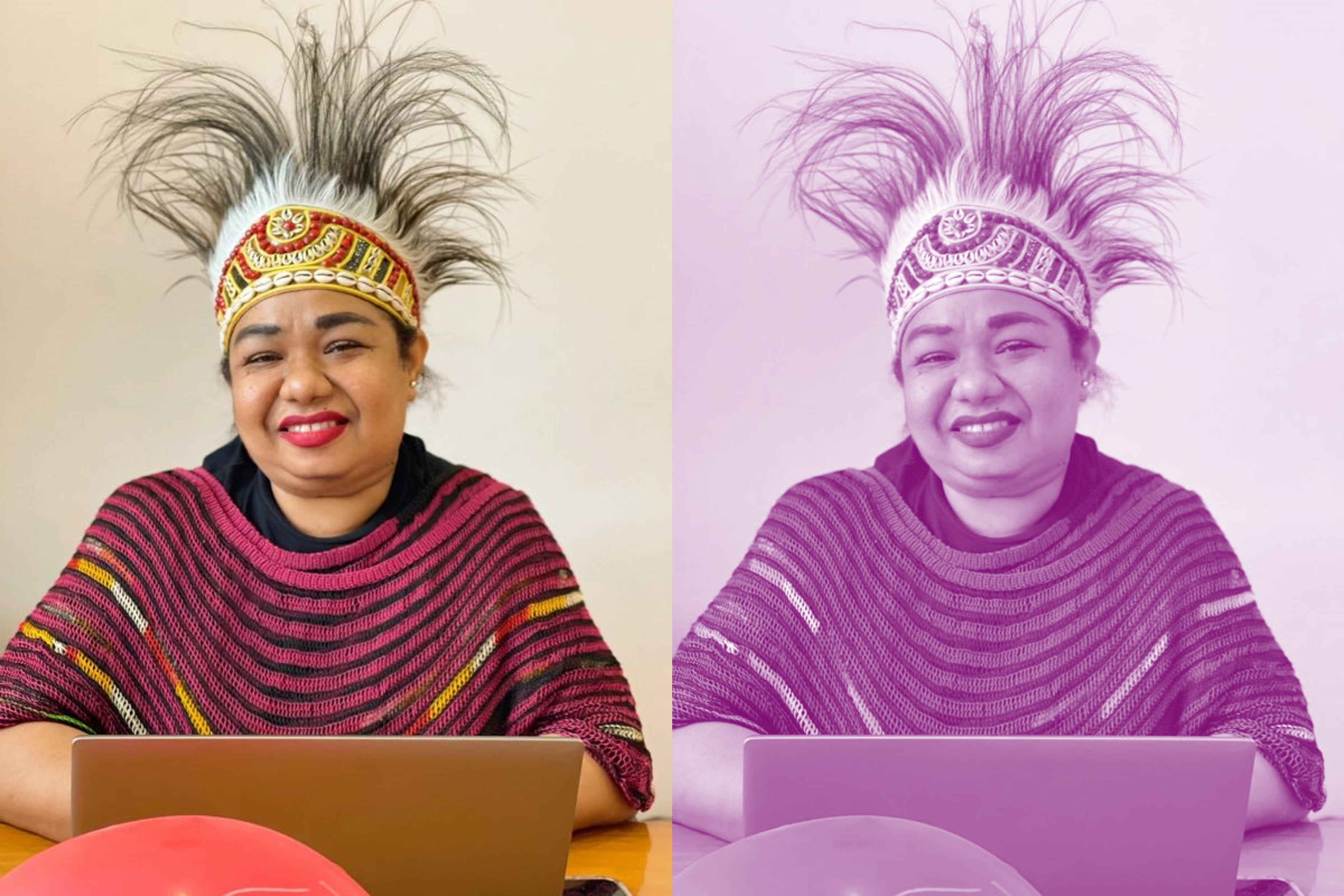Spotlight: Celebrating Local Leadership – The Inspiring Journey of Sella, an Indigenous Papuan and a Local Leader

Ms. Presilia (Sella) Haiy, SKALA’s Provincial Engagement Specialist in Papua reflects on development and the impact of local leadership in Indonesia.
In the heart of Papua, local leaders like Sella are making a positive difference for their communities. Her story is one of dedication and a profound connection to her land and people. Sella’s journey from a challenging childhood to becoming a driver of development highlights the importance of Indigenous perspectives in sustainable and inclusive progress.
The Early Years
Sella grew up on a small island near Jayapura, where her daily commute to school involved a canoe ride across the water. Her early life was marked by a constant balancing act between her family’s limited resources and her educational aspirations.
“My father was a civil servant, but after he passed away, things became very tough for my family. Sometimes my mom asked me to choose whether to give the 10,000 rupiah she had to me for school or to spend it on stuff to cook so the whole family could eat,” she recalls.
Despite these significant hardships, Sella’s determination saw her through school and eventually to Cendrawasih University in Jayapura for a bachelor’s degree in education. She then began teaching at a local school. However, she quickly realized that systemic issues were hindering true progress.
“I remember receiving only 200,000 rupiah as my salary one month. It was not enough to live on, let alone to support a family.”
This experience propelled her to join Bappeda, the regional development planning agency, in Jayapura, where she could influence change on a larger scale. While working there, Sella became involved in planning and budgeting for local infrastructure projects. This experience sparked her passion for development and led her to pursue a master’s degree in international development at Clark University in the USA. The scholarships that she won to pursue higher education are a true testament to her dedication.
Yet, despite opportunities abroad, Sella’s love for her homeland drew her back to Papua. Her decision to return was driven by a sense of responsibility and an emotional connection to her roots.
“I love my land very much. I love the people,” she explains, her eyes glistening. “I worked in America for almost a year after graduating, and I felt like there was something missing in me. Seeing how advanced America is, the kids there are so smart, the people are so aware. I thought, ‘what am I here for? America doesn’t need me, but my Papuan mothers, children, and brothers do.’ The challenges here are unique, and it is the indigenous people who understand them best.”
Bringing Indigenous Perspectives to Development
Sella’s work with SKALA as well as with the USAID Kolaborasi project and the Jayapura City Planning Agency is instrumental in bridging the gap between government programs and local needs. Her identity as an Indigenous Papuan plays a crucial role in her approach to development. A notable achievement early in her career was securing government funding to build a bridge for a community of fishermen in Jayapura.
“There is a hidden connection between Papuans that is hard to explain. This connection helps build trust and facilitates collaboration. I can use this connection to help improve lives. For example, with government funding, we built a bridge that connected the fishermen’s homes to the main road, making their daily lives much easier. Seeing their smiles when the bridge was completed brought me to tears.”
The impact of such projects goes beyond physical infrastructure; it signifies hope and progress for local communities. And it wasn’t just a personal moment for her; she felt a profound love for doing something that the community couldn’t achieve on their own due to financial constraints. Such initiatives, Sella believes, must be supported by the government.
Challenges and the Path Forward
Since joining SKALA in January 2024 as a provincial engagement specialist, Sella faces many challenges in aligning national programs with local realities. Convincing local governments to adopt new systems and approaches is often met with resistance. However, her deep understanding of local contexts and her ability to communicate effectively with both government officials and community members is key to success.
“I use my kinship with fellow Papuans to build relationships with the government. You see… Papuans are very happy to come together to do good things for our land. This makes my job in building trust with the provincial government easy,” she explains.
Sella also emphasizes the importance of comprehensive approaches to development. She knows that providing financial support alone is insufficient; capacity building and ensuring sustainability are also essential. For example, she explains, giving a fisherman a boat is only beneficial if he knows how to process the catch to fetch a good price, and there’s a market for him to sell his catch. She believes that the key to successful development in Papua lies in understanding the unique cultural and social dynamics of the region.
“Being Papuan, gaining the trust of other Papuans is easier somehow. Even when they are a big boss in government or wherever, I can still convince them to buy into the programs or to trust the project because of this bond we share.”
Indigenous Perspectives on Development
For Indigenous Papuans, development means more than economic growth. It encompasses access to essential services, equal rights, opportunities, respect, the ability to use natural resources sustainably, and maintaining close family ties.
Sella highlights the disconnect between global development indicators and local realities. She explains that global indicators often do not fit the local context. For example, access to nutrition might be measured by the availability of certain foods, but in Papua, there are local sources of nutrition that might not be recognized by these standards. She recounts her own experiences growing up on the island.
“When I was a kid, we only had coconuts and salt water. We couldn’t meet the global nutrition indicators, but we survived and thrived in our own way.”
Sella explains that when outsiders see Papuans not using shoes, for instance to go to school, they might think Papuans are underdeveloped. However, she clarifies that this practice is a part of how Papuans are raised.
“It is how we are nurtured by nature. The shoes take away our ability to feel the land, to understand what it needs, and in turn to live in harmony with it.”
This perspective underscores the importance of contextualizing development goals to match the local environment and needs.
Climate Change and Local Adaptation
Climate change is another critical issue that Sella is passionate about, especially given its direct impact on her community.
“On my island, we have had to rebuild our houses because the sea level is rising. When I was a kid, we never had to raise our foundations, but now we have to elevate them by one and a half meters. The rise is dramatic. Some of our ancestors’ graves have even been washed away by sea water.”
She points out that while local governments have helped reconstruct houses, awareness about climate change and its impacts is still lacking. This highlights a significant gap in local governance – the need for better awareness and integration of climate change adaptation strategies into development plans. Therefore, Sella advocates for more comprehensive approaches that not only address immediate infrastructure needs but also prepare communities for future environmental challenges.
The Role of Development Partner Support
Sella’s advice to those passionate about making a difference in governance and supporting vulnerable communities is simple: immerse yourself in the local context. She shares a cultural insight that underscores this point: In Papuan culture, entering a house through the back door and heading straight to the kitchen signifies that you are family. This deeper, personal connection is crucial for effective development work. And this understanding of local culture and traditions is what enables Sella to work effectively with her community. She believes that only by truly understanding and respecting local ways of life can development practitioners design and implement programs that are meaningful and sustainable.
Sella appreciates the support from international donors, particularly the Australian government’s involvement through SKALA.
“The generosity of the Australian government, coupled with the right programs, makes a real difference. Effective governance interventions are key to ensuring that development efforts are sustainable and impactful. Particularly by strengthening government programs that seek to provide basic services needed in Papua today.”
However, she stresses the importance of coordination and context-specific approaches. Sela adds that while every development partner has good intentions, without understanding the local context and coordinating efforts, these programs will fall short.
A Vision for the Future
Looking ahead, Sella is optimistic but realistic about the future of development in Papua. She recognizes the complexities and challenges but remains committed to her mission.
“We need to educate and empower our people to use the resources and support they receive effectively,” she says.
She believes that true progress will come from a combination of government support, community empowerment, and sustainable practices. She emphasizes the importance of teaching communities not just to receive aid but to create value from it.
“We need to strengthen every aspect of the supply chain, from production to market access. It’s about creating a complete ecosystem where support leads to self-sufficiency.”
Her vision for Papua is one where development is holistic and inclusive, taking into account the unique needs and aspirations of Indigenous communities. Development is not just about building infrastructure or the ability to buy things; it’s about building lives and futures.






